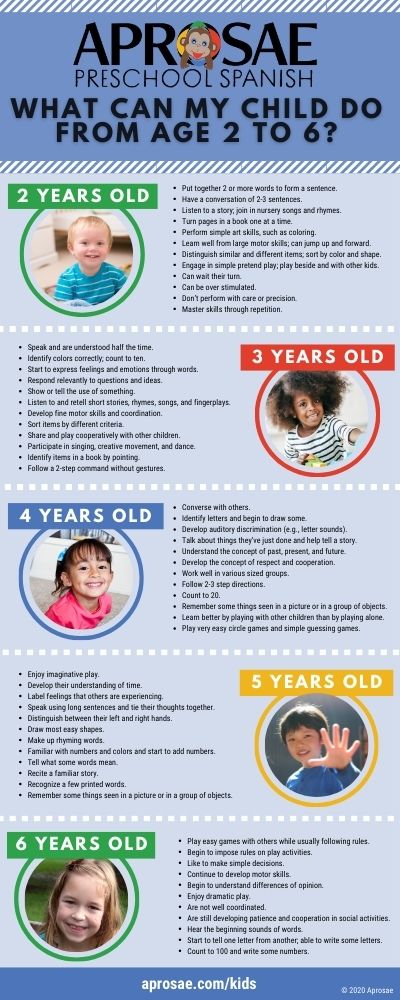
If you’d like a downloadable that tells you what you can expect your child to accomplish with Aprosae’s preschool Spanish resources, you can download it here. This ages and stages downloadable will give you an overview of the early childhood development ages and stages, broken down by ages from two to six years old. Below is the accessible version / alt text for those with visual disabilities and will detail the words that are on the downloadable:
Aprosae Preschool Spanish
What can my child do from age 2 to 6?
2 YEARS OLD
- Put together 2 or more words to form a sentence.
- Have a conversation of 2-3 sentences.
- Listen to a story; join in nursery songs and rhymes.
- Turn pages in a book one at a time.
- Perform simple art skills, such as coloring.
- Learn well from large motor skills; can jump up and forward.
- Distinguish similar and different items; sort by color and shape.
- Engage in simple pretend play; play beside and with other kids.
- Can wait their turn.
- Can be over stimulated.
- Don’t perform with care or precision.
- Master skills through repetition.
3 YEARS OLD
- Speak and are understood half the time.
- Identify colors correctly; count to ten.
- Start to express feelings and emotions through words.
- Respond relevantly to questions and ideas.
- Show or tell the use of something.
- Listen to and retell short stories, rhymes, songs, and fingerplays.
- Develop fine motor skills and coordination.
- Sort items by different criteria.
- Share and play cooperatively with other children.
- Participate in singing, creative movement, and dance.
- Identify items in a book by pointing.
- Follow a 2-step command without gestures.
4 YEARS OLD
- Converse with others.
- Identify letters and begin to draw some.
- Develop auditory discrimination (e.g., letter sounds).
- Talk about things they’ve just done and help tell a story.
- Understand the concept of past, present, and future.
- Develop the concept of respect and cooperation.
- Work well in various sized groups.
- Follow 2-3 step directions.
- Count to 20.
- Remember some things seen in a picture or in a group of objects.
- Learn better by playing with other children than by playing alone.
- Play very easy circle games and simple guessing games.
5 YEARS OLD
- Enjoy imaginative play.
- Develop their understanding of time.
- Label feelings that others are experiencing.
- Speak using long sentences and tie their thoughts together.
- Distinguish between their left and right hands.
- Draw most easy shapes.
- Make up rhyming words.
- Familiar with numbers and colors and start to add numbers.
- Tell what some words mean.
- Recite a familiar story.
- Recognize a few printed words.
- Remember some things seen in a picture or in a group of objects.
6 YEARS OLD
- Play easy games with others while usually following rules.
- Begin to impose rules on play activities.
- Like to make simple decisions.
- Continue to develop motor skills.
- Begin to understand differences of opinion.
- Enjoy dramatic play.
- Are not well coordinated.
- Are still developing patience and cooperation in social activities.
- Hear the beginning sounds of words.
- Start to tell one letter from another; able to write some letters.
- Count to 100 and write some numbers.
